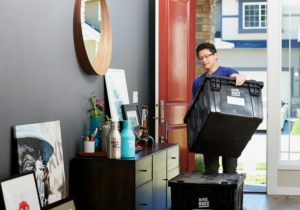It’s early April, and if you’re one of the lucky individuals getting ready to move into a Lang Development Group apartment this June, it’s time to start getting prepared. Moving into a new place can be both exciting and a bit overwhelming, but with a little planning and preparation, you’ll be settling into your new home in no time.
First things first, let’s talk logistics. In May, you can expect to receive an email from Lang Development Group with important information about your move-in process. This email will cover essential details such as when and where to pick up your keys, how to set up utilities and rental insurance (required), and confirmation of your rent amount. It’s crucial to keep an eye out for this email, as it contains vital information to ensure a smooth transition into your new space.In June you will receive another email providing instructions on how to create a login for Rent Cafe. This online platform will become your go-to hub for managing various aspects of your tenancy. From paying your rent securely and conveniently to accessing a real-time ledger of your transactions, Rent Cafe simplifies the rental experience. Additionally, you’ll have the ability to submit maintenance requests effortlessly, ensuring that any issues in your apartment are promptly addressed. With Rent Cafe at your fingertips, managing your rental property becomes streamlined and stress-free.
Now, let’s talk about what you’ll need to make your new apartment feel like home. We’ve compiled a list of essential items that you may want to begin accumulating or discussing with your roommates to coordinate who will bring what:
Miscellaneous:
- Garbage bags/cans
- Replacement light bulbs
- Fire extinguisher
- Broom
- Dustpan
- Bucket
- Mop
- Cleaning products
- Vacuum
- Flashlight
- Extension cords
- TV
- Scissors
- Snow shovel/snow removal tool (for students bringing a vehicle)
Bathroom:
- Plunger
- Shower curtain/liner/rings
- Toilet paper
- Bath mat
- Towels
- Trash can
- Shower caddy
Living Room:
- Table and chairs
- Lamps
- Sofa
- Rug
- Curtain rods and curtains (apartments include blinds)
Kitchen:
- Tableware and flatware
- Dish detergent
- Dishwasher detergent
- Dish towels
- Oven mitts/pot holders
- Pots and pans
- Coffee maker
- Toaster
- Food containers
- Cooking utensils
- Can opener
- Paper towels
- Condiments
Laundry:
- Laundry detergent
- Hamper/laundry bag
Bedroom:
- Curtain rods and curtains (apartments include blinds)
- Bed/box spring/mattress
- Sheets/pillowcases/pillows/blankets
- Hangers
- Night table
- Lamp
- Desk
Taking the time to gather/coordinate these essentials now will make your move-in process much smoother come June. Remember, preparation is key! And once you’re all settled in, you’ll be able to kick back, relax, and enjoy your new Lang Development Group apartment. Happy moving—we’re glad you’re a part of the Lang family!

lmk 2024


